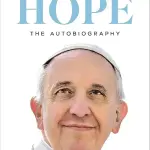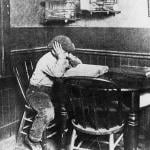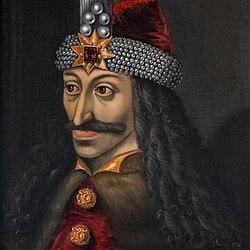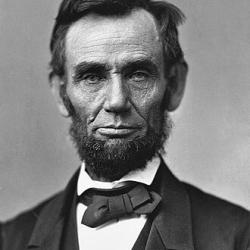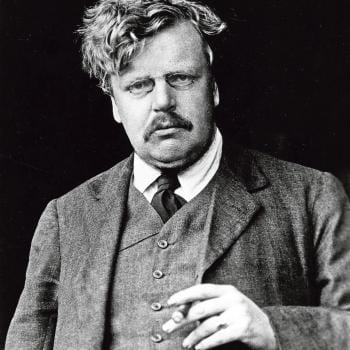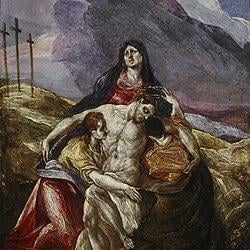In a guest article for the Catholic Bard
has allowed us to share his testimony of how he went from a harsh critic of Pope Francis to a staunch defender of Pope Francis.
This is the Catholic Bard’s 750th post on the feast of St. Athanasius.
Fr. Matthew is priest at Franciscan Missionaries of the Eternal Word and Assistant Chaplain at EWTN and has a very bright Facebook presence, which is where I found this article.
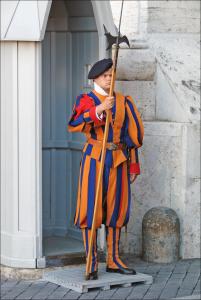
Fr Matthew Mary Bartow: The following is an article that will appear in our community’s newsletter next month. Some people who have known me for years have wondered about my change of heart towards Pope Francis, how I turned from being a critic to a staunch defender of the Holy Father. Here is a summary of my recollection of the events that led to my change of heart and mind:
MY JOURNEY WITH POPE FRANCIS
I can say without hesitation that Pope Francis has been the most challenging pontiff of my lifetime. Perhaps that is not saying much as someone who has only been Catholic for the last 22 years. Pope St. John Paul II, whose pontificate spanned nearly three decades, was certainly one of the most influential popes in recent years. John Paul II was overwhelmingly beloved by most Catholics throughout the world. His successor, Pope Benedict XVI, pretty much maintained the status quo in the Church as he continued with the progress made in the decades following the Second Vatican Council. Prior to his papal election, Cardinal Ratzinger (later Benedict XVI) had already established himself as an accomplished theologian and author and his writings are likely to be studied in seminaries and universities for decades to come.
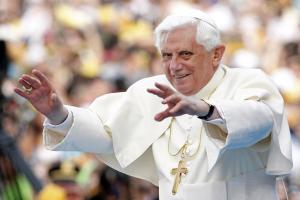
However, when Pope Benedict XVI announced his resignation from the papacy, many Catholics seemed to sense the significant weight of this event, and they seemed to share a feeling of uncertainty. There was plenty of speculation about the next papal election and which cardinal would be elected to ascend to the See of Rome. When the white smoke appeared from the Sistine Chapel, the world awaited the emergence of the new pope on the balcony of St. Peter’s Basilica. At the time of the 2013 papal election, I was studying at seminary, and I recall a mixed reaction among seminarians when it was announced that Cardinal Jorge Mario Bergoglio from Argentina had been selected and had taken the name of Francis. It seemed that many of my peers were hesitant about this selection, and I could not understand, at the time, the reason for this hesitancy. After all, I had only been Catholic for a decade at the time and was relatively uniformed of internal Church “politics.”
Pope Francis Pontificate Progresses On
As the pontificate of Francis progressed, I noticed a significant difference in his pastoral and catechetical approach from his predecessors. While some people who are more “traditionally” minded began to take issue with some of the things he was teaching or with some of his answers to questions in interviews, I found his teaching to be rather benign. His teaching style was indeed distinct from that of other popes, and so I could sympathize, to a degree, with the complaints of those who regarded his teaching as unclear or ambiguous. However, I found that his teachings, were quite clear, so long as they are considered in their proper context.
To be sure, there was a period of about a year and a half when I seriously struggled with Pope Francis and his teaching, especially as the clergy sex abuse scandal resurfaced in 2018 along with allegations of abuse that surfaced against the former cardinal Theodore McCarrick. The release of the Pennsylvania grand jury report that year found that 300 priests in six Pennsylvania dioceses had been accused of or implicated in sexual abuse. The Catholic faithful were understandably upset with these public revelations of clerical abuse. Within this milieu of anger directed towards the Church hierarchy, the now-excommunicated archbishop Carlo Maria Vigano publicly released a “testimony” that consisted of his recollection of how the McCarrick situation was handled. In the testimony, Vigano implicated certain bishops whom he claimed were involved in the cover-up of clerical abuse, and he even leveled accusations against Pope Francis himself. As a newly ordained priest, I was greatly shaken by all these events and by the testimony of Vigano. I could sense the anger of the lay faithful building, and I desired to echo their demands for answers from the hierarchy.
Struggling With Understanding Happenings in the Church
For nearly two years following the release of Vigano’s testimony, I struggled to understand exactly what had happened in the Church. I discovered certain Catholic figures online who had been quickly garnering popularity and who became severe critics of the Holy Father. At first, I thought that these critics were genuinely searching for the truth but I later realized that they were only contributing to my overall confusion. Sadly, I was caught up in this spirit of unjust criticism towards the Holy Father. This does not mean that all criticism is invalid, unjust, or disrespectful. There are indeed times when criticism is warranted to the extent that it comes from people of good will who desire to assist the Holy Father and the Bishops in fulfilling their magisterial role. It is necessary for the lay faithful to have the freedom to express their concerns and criticisms to the hierarchy and the hierarchy should be open and receptive to these concerns.
But, as I would later come to understand, the criticism that came from these prominent online Catholic voices was often disrespectful of the Magisterium, was unfair towards the teaching of the pope and presented it out of its proper context, was gravely uncharitable, was motivated by ideological agendas that were not fully compatible with Church teaching and with current liturgical practice, and only served to stir up harsh, negative, bitter, angry feelings among the laity and some of the clergy. These hypercritical voices had greatly influenced my own thinking that I started to question and even doubt some of the beliefs and doctrines I had previously accepted as true prima facie, such as the validity of the election of Pope Francis and the doctrine of papal infallibility. My relative ignorance of the documents and teachings of Vatican II, aside from what had been covered in seminary, left me vulnerable to the extreme criticism against the pope that had been coming from radical traditionalist circles, so much so that I even questioned had the validity of the Second Vatican ecumenical council itself. Radical papal critics such as Vigano exploited the rising popularity of this “traditionalist” rejection of Vatican II and exacerbated these feelings of anger and discontentment among some of the Catholic faithful.
Mingling With Rad Trads Online
As I mingled with radical traditionalists online, I witnessed firsthand some of the extreme ideas they held about the Church and society at large. Many of them are strict monarchists who envision the regression of society to a time when kings and emperors ruled the world, and the Church hierarchy enjoyed greater status and power among secular rulers. The global vision of radical traditionalism includes the foundation of kingdoms around the world that establish Catholicism as the official religion. They also have extreme ideas about women and how they need to be stripped of some of the rights we currently take for granted in the US, such as the right to vote. According to these traditionalists, women should be compelled to dress and to conduct themselves publicly according to the traditionalist ideal. I listened to one traditionalist priest during a parish mission who boldly proclaimed to the congregation (and he did not care whether anyone liked it), that women should literally be “barefoot, pregnant, and in the kitchen.” These were his exact words.
A note of clarification, when I speak of traditionalists, I am not referring to ordinary Catholics who have a love or a preference for what is commonly called the TLM (Traditional Latin Mass). There are plenty of good people who attend the TLM who are faithful people and who love and respect the Holy Father and the Magisterium. I am only speaking of the radical traditionalists who adhere to the ideology that I have described above, those who cast doubt on the Second Vatican Council and who even push people towards sedevacantism, an ideology that rejects the validity of all popes from a given point in time.
During my time among the traditionalists, I witnessed the greatest spiritual darkness I had ever seen. Many of them were filled with anger, bitterness, and resentment, traits that are not characteristic of a Christian who is supposed to be filled with the grace and the love of the Holy Spirit. Although I privately objected to many of these ideas among traditionalists, I continued to listen to them and wondered to myself whether they might be correct, and I might be mistaken. Had I continued down this road of radical traditionalism, I fear that I might have lost my faith in the Catholic Church altogether.
One morning, I recall standing in the sacristy while preparing for Mass as I glanced upon a photo of Pope Francis on the wall. I suddenly felt intense anger bubbling within me directed towards him. It was at that moment that I knew that something was horribly wrong. I should not be experiencing these feelings about the Holy Father. Later, I watched as people who were formerly faithful Catholics fell away from the Church and no longer identified themselves as Catholic. Some former traditionalists even lost their faith in God altogether. I can now see how the extreme critics of the pope only added to my anger and my frustration with the situation in the Church. They did nothing to help or to nourish my faith, instead they only endangered it.
Apex of Anger
My anger towards the Holy Father, which I now acknowledge was gravely misdirected, reached its apex with a homily I delivered at the televised Mass on EWTN in 2019 during which I was critical of an in-flight interview Pope Francis had given that same year. Although the homily was well-received by those who were critical of the Holy Father, I was confronted by some of my own fellow friars in community including my superior. With their help and the support of their prayers, I had the opportunity to spend a few months in prayer to study the writings of Pope Francis for myself and to consider his teachings in the light of the Second Vatican Council. I knew that I needed to read the documents of Vatican II and become familiar with its teaching, since my knowledge of it was severely lacking. I read all the major writings of Pope Francis while also reading through the Vatican II documents. As I immersed myself in these documents, I realized that radical traditionalism had sown a lot of misconceptions into my mind, and I was able to find clarity by reading the documents for myself. In my desire to learn more about Pope Francis as a person, I read a biography on him written by Austen Ivereigh entitled “The Great Reformer: Francis and the Making of a Radical Pope.” It was very well-researched and documented as it presented a detailed account of the upbringing, spiritual formation, academic formation, and ecclesial background of Pope Francis. It helped me to better understand the Holy Father, his approach toward Church governance, and his teaching style, which had been influenced and shaped by his own life experiences in Argentina as he served as the Provincial Superior of the Jesuits and the archbishop of Buenos Aires.
Studying Francis
In my study of the writings of Pope Francis, I noticed an overriding theme emerge that helped to connect his teachings together, namely, Catholic social teaching. Admittedly, I was not well-versed in the teaching of the Church concerning social issues or social justice and had previously only considered the pro-life issues such as the Church’s opposition to induced abortion, euthanasia, and embryonic stem cell research. Then, as I was preparing a homily one day, I came across a quote from Pope Pius XI that helped me to understand the potential positive impact of Catholic social thought on society at large. In his encyclical Divini Redemptoris, Pope Pius XI responds to the growing threat of atheistic communism in the early to mid-20th century, an ideology that exploits real social issues and concerns to implement a political system that is not only dangerous but also incompatible with the teaching of the Catholic Church. One paragraph, number 35, especially caught my attention and subsequently launched my interest in and study of Catholic social teaching.
In this paragraph, Pope Pius XI writes:
“The wisdom and supreme utility of this [Catholic social] doctrine are admitted by all who really understand it. With good reason outstanding statesmen have asserted that, after a study of various social systems, they have found nothing sounder than the principles expounded in the Encyclicals Rerum Novarum and Quadragesimo Anno. In non-Catholic, even in non-Christian countries, men recognize the great value to society of the social doctrine of the Church. Thus, scarcely a month ago, an eminent political figure of the Far East, a non-Christian, did not hesitate to affirm publicly that the Church, with her doctrine of peace and Christian brotherhood, is rendering a signal contribution to the difficult task of establishing and maintaining peace among the nations. Finally, We know from reliable information that flows into this Center of Christendom from all parts of the world, that the Communists themselves, where they are not utterly depraved, recognize the superiority of the social doctrine of the Church, when once explained to them, over the doctrines of their leaders and their teachers. Only those blinded by passion and hatred close their eyes to the light of truth and obstinately struggle against it.”
This quote was eye-opening to me especially given the contentious 2020 general election in the United States. Certain politicians and pundits were railing against policies they deemed to be “communist” or “socialist” and even stirred up public fears that one of the parties, upon assuming office, would implement an authoritarian communist regime. The hyper partisan divide in politics could not have been starker. At the time, I thought that the aim of this type of extreme rhetoric was only meant to demonize the opposing political party while seeking to secure votes for their own party. However, the attack at the US Capitol on January 6, 2021 demonstrated that this rhetoric had the potential of inciting acts of physical violence against other groups of people. In view of the attack on the Capitol, the above quotation from Pope Pius XI seemed even more relevant. If the Church’s social doctrine is as powerful as Pius XI suggests and that even non-Christians and Communists can recognize its inherent value, then it seems clear that this teaching is precisely the solution needed to establish peace and justice and to help unify the nation. When I came to this realization, I committed myself to the study of Catholic social doctrine. I read the entire Compendium of the Social Doctrine of the Church and read a collection of encyclicals from Pope Leo XIII to Pope Francis tracing the development of Catholic social thought as it developed throughout the years.
Growing Appreciation For Pope Francis
As I delved more deeply into Catholic social teaching, I grew in my appreciation and admiration for our Holy Father Pope Francis. Whereas the extreme critics only saw discontinuity and confusion, I saw clarity, continuity, and the true tradition of the Church breaking through. The social doctrine of the Church is a beautiful, comprehensive vision for society that applies the principles of the Gospel to our political, social, and economic circumstances. These principles include the inherent human dignity of every person from conception to natural death, the universal destination of goods (under which falls the right to private property), the common good, solidarity, and subsidiarity.
Throughout my study of Catholic social teaching, I also observed Pope Francis and the way he embodied the very principles of this teaching in his own words and actions. In fact, his teachings cannot be fully understood or appreciated without a basic grasp of the social doctrine of the Church. The Holy Father obviously strove to practice what he preached. In a time of increased social tension between various nations and conflicting factions, Pope Francis emphasized the need for greater human fraternity. He added an exclamation point to Pope St. John Paul II’s call to trust in the Divine Mercy as he appointed over 1200 priests to serve as Missionaries of Mercy and to make known the mercy of God so that it might be appreciated by all. Pope Francis wrote and spoke beautifully in favor of the poor and the marginalized. In his efforts to refocus the efforts of the Church on the work of evangelization, he deemed that all baptized Catholics are “missionary disciples” and are called to bring the message of the Gospel to all parts of the earth, especially to the margins of society where people are often despised and rejected.
Pope Francis’s Contributions To The Church
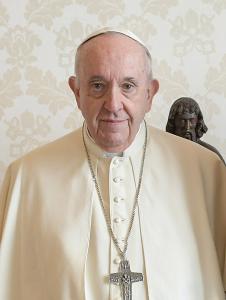
His major contribution to the social doctrine of the Church was his encyclical “Laudato Si,” which concerns the proper care for our common home and for the environment. It is important to remember that Pope Francis is not the first pope to exhort the faithful to care for the environment. Several of the popes who preceded him have also spoken of the need for environmental protection and safeguarding, including Paul VI, John Paul II, and Benedict XVI. The Compendium of the Social Doctrine of the Church dedicates an entire chapter to safeguarding the environment. Pope Francis’ environmental teaching not only develops the social teaching of the Church in this area but also tackles concerns that had not been sufficiently addressed in prior pontificates such as climate change and the deleterious effects of environmental degradation on the poor.
One of the most significant contributions of Pope Francis to the Church is a reminder that the Catholic faith is not an individualistic enterprise. A common temptation for Christians is to act as if faith is merely about one’s own personal relationship with Jesus Christ and that no one else or nothing else matters. Pope Francis reminds the Church that we are all brothers and sisters in Christ and that we are responsible for one another. When we see our poor brethren suffering in another part of the world, and even in our own neighborhoods, we are not supposed to turn a blind eye to them, but to find ways to help them. In other words, we are our brothers’ keepers, contrary to the sinful attitude of Cain towards his brother Abel. Hence the call of Pope Francis to the practice of mercy not only entails the forgiveness of sins, but also the need to address any societal injustices that prevent our poor brothers and sisters from satisfying their material and spiritual necessities. Pope Francis reminds us that we are to love our brothers and sisters unconditionally, as the Lord Jesus has first loved us and has called us to love one another.
Pope Francis did not simply preach love and mercy; he also lived it. He was not a perfect person and had his own faults and flaws, just like any other person, but his heart was clearly united to the hearts of Jesus and Mary. He personally visited homeless shelters and prisons, washed the feet of prisoners and celebrated the sacraments with them, established the World Day of the Poor, advocated for the rights of immigrants and refugees, reached out to people of other Christian denominations or religious faiths and practiced fraternal solidarity with them, strongly spoke out against attacks on human life such as abortion, in vitro fertilization, environmental degradation, and the death penalty, and held annual banquets to which he invited the poor and the homeless to dine with him. In many ways, Pope Francis lived up to the ideals of his saintly namesake, Francis of Assisi. Although Pope Francis was not a Franciscan by religious profession, he was certainly a Franciscan at heart.
Mark on the Church
While it is true that every pope has their imperfections, I believe that Pope Francis has left his mark on the Church that will endure for decades to come. It is this pope who has given me a renewed appreciation and love for the Catholic faith. During his pontificate, I experienced a rediscovery and a renewed awareness of the beauty and splendor of the Catholic Church and the fullness of truth that she has to offer. The late Holy Father has helped me to truly appreciate the traditional adage that has been passed through the ages:
Lex orandi, lex credendi, lex vivendi,
that is, what we pray is what we believe and what we believe is what we are to live.


